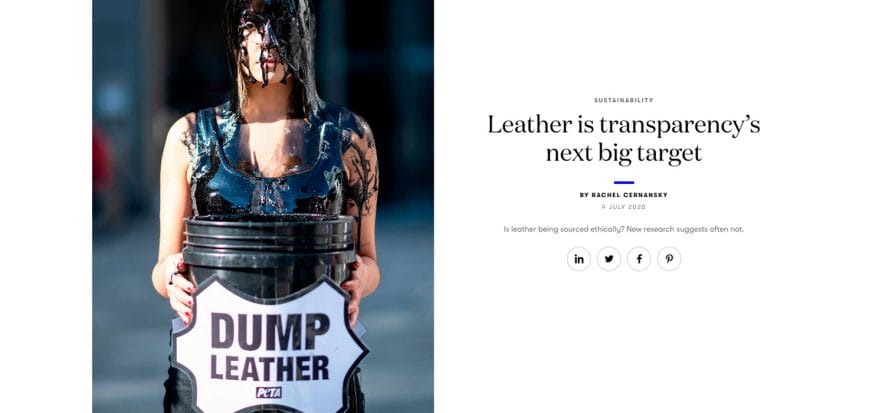The fashion system is focusing transparency efforts on “its next goal”, that is, leather: such is the headline Vogue Business put on the front page. Leather is also the next research subject the magazine should carefully study, as we would like to emphasize. In fact, the article evidences that their knowledge about tanning and livestock, and their relationship, is indeed rather hazy, so to speak.
It comes as no surprise, then, they consider the leather tanning industry to be fully accountable for a number of aberrations and abuses in the live cattle international trade, as highlighted by a video survey, carried out by PETA, from which they took inspiration. Things are not like that though.
The illuminating paragraph
The columnist assumes, in a paragraph of the article, that he got very close to the gist of the matter. “Live animals trade – he wrote – is mainly driven and supported by demand for meat coming from importing countries”. There are actually two mistakes in the sentence. The right adverb is not mainly, but rather completely. Furthermore, trade does not take place only on a worldwide scale, but also on a domestic one.
In fact, they breed and subsequently slaughter cattle to get milk and meat, which are the most important products of livestock and farming industry. Ultimately, the leather tanning industry takes a by-product and turns it into a primordial upcycling process.
The relationship between tanning and livestock
Sometimes, quite frequently actually, even professionals and insiders happen to mix up the role of tanning in the meat-leather manufacturing industry. Drums are not farmers’ customers. Conversely, we make use of them at the end of their process: since they play a circular economy role, they successfully recycle a by-product otherwise bound for landfill or incinerator (depending on local regulations).
We might possibly mention several statements to confirm and corroborate such assumption. Yet, we just need to stick to recent events. The Conseil National du Cuir, the French institution representing the trade industry, recently complained about a specific problem, namely huge stocks of raw hides and skins. During the lockdown period, the livestock and farming industry kept working to feed French people.
By contrast, the leather tanning activity first stopped; then it had to deal with a situation affected by a weak demand. In other words, French farmers and slaughterhouses kept pursuing their own business. Which is to provide people with foodstuffs, not to supply tanneries with raw material. Raw hides’ collectors, who act as a linking player between the two business industries, are now in trouble: warehouses are packed; hence, consequently, they do not know where they can possibly store hides and skins.
An accusing atmosphere
The leather tanning industry, then, cannot be accountable for aberrations or any possible violations committed on cattle and livestock trade. In fact, tanning does not take control of activities. Yet, on the other hand, it does not imply that leather industry does not care about the issue. The article published by Vogue Business somehow insinuates that the trade industry intentionally play dumb, so to speak, to its own advantage.
Conversely, leather does care about a few related issues, such as raw material traceability and animal welfare. Likewise, the leather industry is most interested in social and environmental sustainability. Vogue Business have called on Nathalie Walker, chief director of the Tropical Forest and Agriculture department at the National Wildlife Federation.
She emphasized that leather, over the years, provided itself with a few suitable tools for the certification of products and processes by implementing ICEC, CSBC (in Brazil) and LWG protocols. In the meantime, fashion groups, Kering most of all, have been striving hard to carry out their own plans. Moving back to the article headline, transparency is absolutely a responsible commitment. Leather has been undertaking to work on that for a while: just to make things clear.
Read also:
- France: warehouses full of hides blocked by the lockdown
- The video that disproves all fake news over tanning, animals and environment











